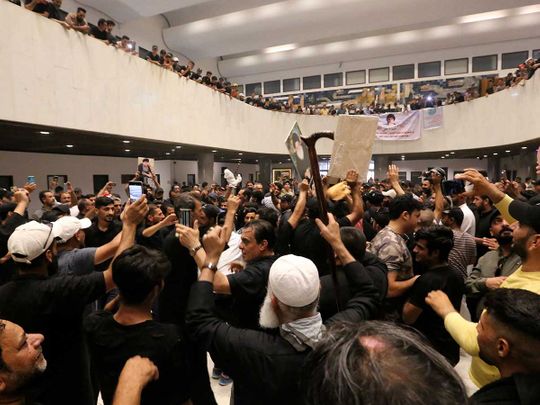
Why is it that certain states, which seemingly have it all — abundant wealth, a storied history, an educated elite, a distinctly articulated cultural heritage and a collective will-to-meaning by the populace — botch their chances at becoming prosperous, stable nations, thus denying the citizenry their place in the sun?
This is the question that we have been asking in recent months as we contemplated the anarchy that has come to define Iraq’s political culture in our time — certainly since 2003, when the US earnestly attempted but dismally failed to graft on the country a neoliberal system of government.
Anarchy, we all remember from Poli-Sci 101, is not anarchism. The latter (from the Greek anarchos, “without authority”) is a political philosophy that, as a movement, seeks to abolish those institutions in society that exercise authority over people’s lives, leaving it to citizens to arbitrate their own disputes and determine their own destiny (sure, dream on, utopians), whereas the former refers to the falling apart in a polity of the social contract between ruler and ruled, leading to endless suffering and widespread despair, often followed by intercommunal violence.
A meltdown
Iraq today, sadly, is a textbook example of this kind of meltdown. And no news report has described it more vividly than the one that appeared in the New York Times on Thursday, filed by the paper’s correspondent Jane Arraf, datelined Baghdad and tellingly titled, “With Government Paralyzed and Militias Fighting, Iraq’s Instability Deepens”.
The crumbling of the very social fabric of the state, caused by the inability or the unwillingness of the political elite to form a government almost a year after parliamentary elections were held in October 2021, came into sharp relief last week when violence exploded in the heart of the capital, where unarmed protesters, representing a milia group, stormed the heavily guarded Green Zone, in yet another antigovernment protest.
This was followed by a rival group of paramilitary militias who arrived on the scene and began shooting at the protesters, whose own armed supporters soon emerged from the shadows to shoot back.
After two days of fighting, Iraqis killed 32 of their fellow-Iraqis.
Iraq, as is well-known, is endowed with abundant wealth. It has the world’s fourth largest oil reserves, and the central bank’s deputy governor, Khalef Ammar, announced on Sunday that the country’s foreign reserves today stand at $85 billion and are expected to reach $90 billion by the end of the year. Yet, Iraq remains nevertheless a nation where one quarter of the population live in poverty, with a broken-down health care system, dismal public services and decrepit schools.
Once Iraq’s educational system was the envy of many Arab countries. Today, reportedly half the student body drop out before finishing high school and often go on to work the streets as vendors.
Meanwhile, rampant corruption is not a joke. In modern-day Iraq, it is legion, taken as a norm, a right by the ruling elite to exercise.
Huge corruption
Last month, Ali Allawi, the country’s respected finance minister, resigned with a warning that “staggering levels of corruption” — corruption that dominates entire sectors of the economy and siphons off literally billions of dollars from public funds — were not only draining the country’s resources but posing an “existential threat” to the body politic, as indeed corruption is known to often do in whatever country it takes place.
So, who cares? Let Iraqis, you say, solve Iraq’s problems on their own.
Truth be told, it’s not as simple as that, for in the Arab world, a world whose 22 independent states constitute subsystems of one system, building blocks of a social, political and cultural whole, whose peoples share the same language, history and culture, the palpable weakness in one state — impacts others. In short, the fate of stable Arab states is entwined.
And what else is there left to say other than that, yes, let’s face it, societal collapse in Iraq — for collapse it is — was not caused by a natural catastrophe, such as pestilence, famine, population decline or, say, a volcanic eruption that brought with it destruction on a Pompeiian scale.
That collapse was man-made, which, when looked at ethically, is all the more painful to contemplate.
— Fawaz Turki is a journalist, lecturer and author based in Washington. He is the author of The Disinherited: Journal of a Palestinian Exile.









